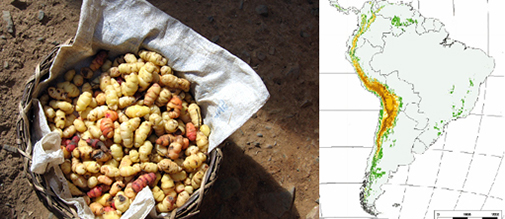PhD Defence: María Elena González Romero

Mashua, a South American species belonging to the Brassicales order, used as a “barrier crop” to protect neighboring potato plants from insects and pest attacks.
Title of PhD Thesis
Towards sustainable potato production using biotechnology
Summary
The glucosinolate-myrosinase system, also called the “mustard bomb”, is a plant defense system present in the Brassicales order. Glucosinolates and their hydrolytic enzymes, myrosinases, are separately localized in the plant tissue. When this spatial separation is broken, both components get into contact resulting in a variety of toxic compounds mainly isothiocyanates. Consequently, glucosinolates and their hydrolysis products act as defence compounds against herbivores and pathogens in the plant they are produced. Sustainable agriculture has exploited the beneficial effect of the “mustard bomb” in the field, using crucifers as “breaking crops”. In the South American Andes, mashua (Tropaeolum tuberosum), a species belonging to the Brassicales order, is used as a “barrier crop” to protect neighboring potato plants from insects and pest attacks, due to the presence of the glucosinolates-myrosinase system in this native plant. By combining traditional knowledge and agricultural biotechnology, the goal of this project was generate resistance against potato pests such as P. infestans and Andean potato weevils by transferring the glucosinolate-myrosinase system into potato. In this thesis, the first steps into the establishment of the mustard bomb in potato are detailed.
Supervisor
Professor Barbara Ann Halkier
Dept. of Plant and Environmental Sciences, UCPH
Opponents
Professor Ute Wittsctock
Technische Universität Braunschweig, Germany
Professor Johan Meijer
The Swedish University of Agricultural Sciences (SLU), Uppsala BioCenter, Sweden
Professor Alexander Schulz (Chairman)
Dept. of Plant and Environmental Sciences, UCPH
Reception
The defence will be followed by a reception.
All are welcome!
Contact
 |
María Elena González Romero |
